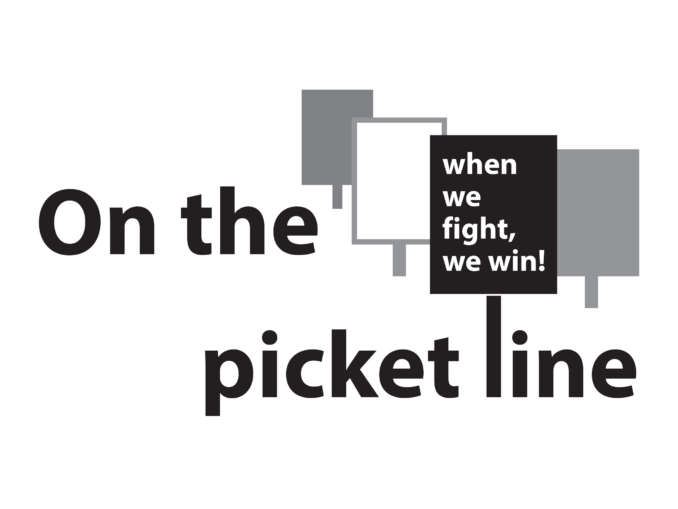On the picket line
Year of the Nurse
The World Health Organization designated 2020 as the Year of the Nurse and the Midwife. That January hospital administrators surely planned to deliver their standard “angel of mercy” platitudes and pizza parties to commemorate. Then the pandemic happened, and the Year of the Nurse turned into the Year of the Nurse Labor Organizer.
Nurses became essential frontline caregivers for the thousands of COVID-19 patients crowding emergency rooms and intensive care units across the country. The inadequacies of a capitalist health care system were all too apparent to them.

National Nurses United, the union for professional nurses, held vigils across the country to mourn and honor the hundreds of nurses and thousands of health care workers who lost their lives due to COVID exposure in their workplace. Nurses as workers and union members stepped to the forefront to demand hospital corporations put patient and staff safety over profit. Nurse walkouts, protests and strikes happened in record numbers from Hawaii and California to Pennsylvania and Massachusetts.
Nurses won major concessions in their union contracts, including pay raises and safe staffing ratios. Adequate staffing and monetary compensation for this difficult job are essential to ensure nurses can provide quality patient care.
OSHA turns 50
The bill creating the Occupational Safety and Health Administration was signed into law Dec. 29, 1970 — the result of labor unions’ political pressure on Congress to respond to the rising rate of workplace injuries in the 1960s. OSHA’s budget and political pressures on the agency have never allowed it a comprehensive watchdog role over corporate capitalists. But now, 50 years later, OSHA’S enforcement capacity is especially bleak.
OSHA has an inadequate inspection system, with the number of OSHA workplace inspectors shrinking as retiring inspectors are not replaced. And OSHA data on company safety records is not a transparent system, making violations hard to trace. These two factors make it very easy for corporate capitalists to evade their legal responsibilities in relation to workers’ health and safety.
Amazon is a prime example of a corporation that puts production and profit above worker safety — with an injury rate to prove it. Increased use of robotic technology, at Amazon and in many industries, puts significant strain on workers as they are forced to maintain punishing productivity levels. (tinyurl.com/y35bug2y)
If this weren’t enough to expose the fact that the federal government serves the ruling class, consider these facts on OSHA’s handling of the COVID-19 pandemic. September 2020 revisions to OSHA criteria for workplace reporting of COVID infections among workers will make it easier for businesses to underreport case counts. (Union of Concerned Scientists, Dec. 14, 2020) OSHA has only provided vague guidelines for proper measures to protect workers from infection while on the job. This laissez-faire approach on OSHA’s part has put workers at the mercy of bosses — who will cut corners when it comes to safety in order to maximize profit. This is why capitalism is a death sentence for the working class.
$15 minimum wage . . . Too little, too late?
The Fight for $15 campaign began in 2012 and continues to win victories for the working class. Black and Brown workers are leading this movement for economic and racial justice. According to the National Employment Law Project, one in three Black workers and 27% of Latinx workers are in low-wage jobs. According to NELP, “these disparities are the result of structural racism . . . and an economic system rooted in chattel slavery and genocide.”
NELP published statistics in December 2020 outlining where the Fight for $15 activists have pushed state and local governments to pass laws requiring a $15 minimum wage. Of the states, California, Florida, Illinois, Maryland, Massachusetts, New Jersey and New York have all done so. In 13 cities, including Chicago, San Francisco and Washington, D.C., the minimum wage will also hit $15-an-hour. President-elect Biden says he will endorse a $15 minimum wage law at the federal level. (NY Times, Dec. 31, 2020)
These victories can be celebrated, but the struggle continues. Applying the Congressional Budget Office Consumer Price Index updated to 2024, the Economic Policy Institute projects that the cost of living in all but 3 states will require a wage of at least $15 an hour and as high as $20-$25 in many states. This includes Pennsylvania where currently the minimum wage is still $7.25 an hour. Is it any wonder that Philadelphia has the highest poverty rate of any major city in the country? Isn’t it clear why food insecurity is a common problem in the U.S., when food costs have nearly doubled over the past 10 years, but wages remain stagnant and at a poverty level?

